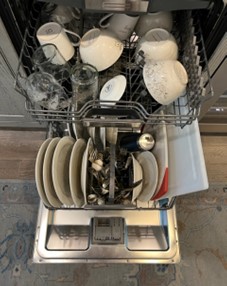Discovering Inspiration in What Drives Us Nuts!
October 15, 2022
A few days ago, I was sharing a drink and some sandwiches with a couple of work mates at an airport eatery, killing time before our respective flights back home departed. As guys are often wont to do, our conversation drifted into a Seinfeldian discussion of observations and subsequent questions. Given we were eating perhaps all three of us sensed a subliminal urging into a culinary-oriented discourse of food, food preparation, and kitchen appliances.
Which brought us to the plight of the automatic dishwasher.
All of us married, we quickly reached universal agreement that the act of rinsing and then loading the dishwasher was not so much a disdainful chore, but rather it was the unloading that was found loathsome. We evaluated the source of our contempt and concluded two factors were of influence. One, there seems to be a higher degree of thought that goes into the emptying process. Where do the utensils go and how should they be configured? When unloading, does other cookware need to first be moved to accommodate those most recently cleansed? Have bowls or glasses been overturned in the cleaning process and accumulated that dingy “graywater,” that requires a manual re-rinsing?
The second consideration was the manner in that the kitchenware may have been loaded initially. Had larger items such as colanders or large measuring cups occupied significant space, when they might have been handwashed at the outset, thus deferring the automatic washing process and subsequent unloading for at least 12 more hours?
Of course, we reached no remedy to our dilemma, except for feeling a bit more lightened through discovering mutual comradeship and “misery” by talking it through.
What is your peeve? Is it the toilet paper positioned up or down? Or maybe no roll at all, and worse, too late? An automobile driver’s seat moved too far forward, or back? The tube of toothpaste squeezed from the middle, or front?
Enough of these annoyances piled on top of one another can result in aggravation, anger, and even lashing out at an unaware loved one or bystander.
Why do these seemingly inconsequential things annoy us?
An article in “Psychology Today” examined our reactions. It revealed that there can certainly be physical and mental factors contributing: sleep deprivation, stress, illness, financial concerns. Making matters worse, guilt might often consume us following our response, bringing about not only embarrassment, but further aggravating our sense of shame.
Oftentimes, the fundamental issue can be a sense of our “space” having been invaded, reflecting a time and place to do a “reset.” What are ways to step back and discipline ourselves to rethink? The article shared five examples:
1. Set a limit. Someone asks you an irksome question that you really don’t want to answer. One approach can be to respond with “I’m not prepared to discuss that at this time.” Another can be “That is really difficult for me to talk about at this time.” Should the questioner continue, ask to change the subject, or offer, “I need you to stop.”
2. A need to protect your time. Little intrusions matter. Even the five minutes it takes to unload the dishwasher is time to do a brief read, take care of another chore, or “check in” with a loved one.
3. Identify another approach. Will waking up 15 minutes earlier help? Should tasks be broken up into diverse increments such as take out the trash, watch a 30-minute show, unload the dishes rather than the chores all in a consecutive row?
4. Resentment and anger. Speak out. Don’t stuff it. “I feel I’m doing a great share of the chores. I really could use help.”
5. Finally, it may be us that suffers from perfectionism. You get mad at yourself for falling short of your own expectations. You’re human, give yourself a break. Likewise, if another person fails to live up to your standards, either express your hopes, or try to see things from a different perspective. Better yet, is it worth hanging onto or should it be let go?
My Mother-In-Law had a saying posted in her house—“Thank God for dirty dishes, they have a tale to tell; while other folks go hungry, we’re eating very well.”

READ MORE
Who Do You Want On Your Team
Time to unload...
The Seed Sower

